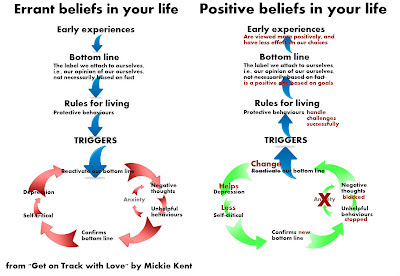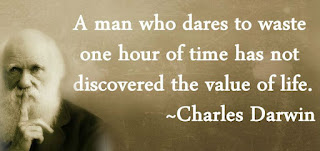
I hope all my readers enjoyed their spring break
as much I did. The weather, although rainy at first settled down into a good mood, It's beautiful weather where I live at the moment. Not too hot, with a gentle breeze that tickles your soul. It's what some call
travelling fair season.
And I love waking up to a spring morning, as the sunlight comes cascading in through the blinds, warming our senses to a lazy wakefulness. It's a great start to the day.
I have four immediate needs first thing in the morning: a pee, tea, a period of reflective silence about the day ahead, and a quick reassurance that nothing has happened in the night that might change that day drastically. I do that by surfing through news headlines online.
News checking is much more than a morning routine - I'm a girl addicted to current events, and always try to catch up with what's changed on my personalised news stream service. Because our world never ceases to amaze me. Situations and events from the ridiculous to the sublime fill the virtual papers.
Here is the news
It'll come as no surprise that human interest always majors in the headlines: heartbreaking stories of teenage domestic violence, parents bringing up autistic children, to eye-opening reports of British teen twins defrauding the American stock market for millions of dollars. And from the mischief kids get up to today, to articles of historical interest revealing that Bob Marley was a strict father and that some parents were pushy even in ancient Rome.
The list of interesting facts continue: with data showing early milk feeds benefit premature babies, romance is driven by women and that there are huge water resources lying under Africa, or how dirt can reveal details of lifestyle, swans can kill people, and strokes can break your inhibitions.
Still on health, did you know that shift working can be bad for you, the nickel content in British coinage can cause skin disease and there is a mysterious skin disease plaguing Vietnam?
How about getting informed updates on science and new technologies for the non-Luddite: electrons with split personalities, machines that listen and learn, new internet suffixes, new laws over cookie tracking, disputes over intellectual property and copyrights online, and the introduction of mini sticky credit cards to name but a few.
It doesn't end there. You can read reports on kidnapped penguins from theme parks and giant mechanical animal theme parks and street theatres. Or discover Shakespeare in 37 different languages, the joys of seasonal eating, and how obscure words are good for us.
Similarly, have you ever wanted to know who gets on the FBI's top ten wanted list? Or about firms that use misleading and undesirable trade names or force you into retirement? Or what recipe rage is? Or dark tourism? Or who became the most hated man on the internet for his (now thankfully defunct) revenge porn site? Or the hate crimes that have divided the Amish community in America, Bergholz, eastern Ohio? Or the Norway island massacre?
Crucially, a quick skim read of these last news stories would have many claiming that it paints a picture of a world going steadily downhill.
Read how to protect yourself from negativity.
On the way to destruction?
Cruising home one day after work with the sunroof peeled back to let the spring breeze in, I came across a heated phone-in on the talk radio station I had just tuned in. The radio station had evidently just heard one caller say how he was stocking up on freeze-dried food, guns, and ammunition, because of the coming social chaos (he didn't say why there would be social chaos, but he was certain it was coming).
Keeping an open mind, I always say each to their own - we thankfully live in a society with freedom of speech - but as I listened to the heated exchanges I wondered why we had all become so polarised. Judging by the angry reaction of the people calling in to respond, tolerance of other people's views (however strange they may seem to us) is sorely lacking.
Everybody is an individual. So, why do we make such a fuss over differing views? Why are we becoming extreme in the way we express our anger? I don't understand it, just like the polarising effect of the Twitter hashtag, or those debates people are forever getting into with back and forth disputes on Facebook.
Virtual vandalism is what I call those Facebook arguments. You guys know what I'm talking about: someone writes something that someone else doesn't agree with, someone comments back refuting what the original person said, original person defends their stance, other people get involved, situation gets out of control, and so on and so forth.
Each to their own I say again, but here's a concept: If you don't like what someone says, how about just not saying anything at all? I kind of thought we all learned that in nursery school. I read plenty of things that I think are completely ludicrous, but every time I want to write something in response, I just think to myself, chances are you're not going to change their mind anyway, so why bother? Why not just leave well enough alone?
Really, if someone thinks Marvin the Martian would be a great president, who cares? If you don't like what's being said change the conversation, or stay out of it. It's like the saying, "Good manners sometimes means putting up with other people's bad manners" - sometimes we just have to let people think what they want and not try and crucify them for it.
You can imagine how allowing myself to be bombarded with such negativity from the radio had sunk my good mood in the car. I should have used the off button, but my thoughts came around to how everything seems to be so dramatically and unnecessarily polarised in our world, pulled to either one extreme or the other.
No one seems immune. In the heat of the moment we can forget there is such a thing as the grey area, and not to acknowledge this fact can be hazardous for your wealth, health, and freedom. You see, the grey area often gives you a third option, a middle way between two poles of extremes. And having options is a good thing - because freedom means having freedom of choice.
In moderation to the extreme?
Glancing at the news this morning over the Norway terror trial against Anders Behring Breivik for killing 77 people last July, when Breivik confessed to admiring Al Qaeda as an enemy, I wondered that if this man is the opposite (and surely not an antidote) of Islamic extremism, shouldn't we feel more confident that moderation, the third option, is the only answer?
However, for the listeners of the talk radio station as I was driving home, it could have been that the gun-toting man on there raving about stock-piling up against world chaos had touched a nerve.
There will be some who ask, how far should moderation go? Should we have intervened in Breivik's madness before he killed all those innocent people? And if he isn't a lone terrorist, should he now be tortured (as Islamic extremists and sympathisers have been by America's secret services) for information to stop other extreme right-wing groups continuing their attacks - such as in Germany against the Turkish population there?
Dare to dream of a better world
Race. Guns. Abortion. Religion. Politics. Football. These are issues we all know to stay clear of at a dinner party. And I'm not talking about constructive, creative arguments and discussions that are carried out in an open minded debate with an air of respect for everyone's views and stance.
Evidently, I'm talking about when people can get so divided in their views that you can literally feel the steam building in their ears as the discussion hots up! That isn't being passionate, it's being blinkered, and that can't be good for your health. And that's because of the extremist way we tend to view things in society nowadays.
And the issue of America and religion is a prime example. Constitutionally they have freedom of religion, yet needless to say, people scatter into factions that seem to despise and deny the other faction. But here's an interesting fact: of all Christian Americans asked the question of whether which religions they would prefer their children marry into, ranked by preference, which religion do you think came bottom of the list?
Muslim? No. Buddhist? No.
It was the atheist - people with no religion at all. Plainly people believe we must all believe in some form of deity. Christians surveyed would much rather have Muslims as in-laws than atheists. Now this might not be so surprising we when understand that religious extremists founded the United States, so maybe it's just in their DNA. I always wonder why they refuse to accept a draw in their sport of football. They insist on a winner and a loser. But seriously, doesn't freedom of religion include the right to not have a religion?
Now, I'm not saying I agree with atheists, but I surely don't expect everyone to believe the same way I do, nor would I want to discriminate against them if they believe differently.
Going on, in America one subject that undeniably polarises people is the issue of gun control. From what I've come to understand from the news reports, people will generally polarise into two options here: ban gun ownership or allow it. Each will have their own arguments that they will vehemently defend and will gladly walk off a cliff arguing their corner. Gun ownership is a constitutional right "to bear arms", but can the average person out there be trusted with one? This is pretty much how this debate goes.
Or is there a third option? Maybe that third option could go something like this: guns are a constitutional right and a valid defence of life, liberty, and property, but gun owners should have rigorous training before being granted a license that they have to renew annually, and the gun can only be a handgun and kept in a finger-printed locked safe at home.
Frankly, it's only a suggestion - hey I'm not even American, so why should I care, right? I just want the high school shootings I keep reading about in the news to stop.
My suggestion is open to modification, that's the good thing about finding a middle ground, and what I'm trying to show is that there is a grey area, a third option here. A workable option will move things forward, not keep them stuck in the same trench of dispute. And I'm not giving my own personal opinion on guns, merely that a third option can and should exist.
Ever divisive, abortion is another issue that heats up America. Of course, the arguments here are as simple as they are extreme: either allow abortion or outlaw it. Surely there can be no third option here?
For me, as a woman who believes that life is sacrosanct, I can never imagine doing what I consider to be harm to life growing inside of me. However, some experts believe that there is a brief window during early pregnancy where it's not an actual baby that is being terminated.
Unquestionably there needs to be clarification. How do you define a baby? Is it from the time there's a heart beat, and if so, when is that (from a factual, scientific perspective)? I don't pretend to have the answers, but I would be foolish to think that the option of abortion should not exist for those that think differently than I do - or for those whom abortion might be a lifesaver.
Consequently, freedom of choice is essential, and I certainly wouldn't want to hurt anyone that had an abortion. I find it ironic how pro-life supporters endanger lives sometimes with their violent protests. I believe I only have a right over my body, and I wouldn't feel comfortable having the law take that right away from someone who believes differently than the majority - even if I can't even imagine how any woman would want to abort a new life forming inside of her.
Knowingly, the fact that grey areas can be disconcerting should not lead to people lose the greatest freedom of all, the freedom that can never be taken away: freedom of independent thought. It doesn't have to be a case of "You're either with us or against us!" There is always a third option, and there is a way to co-exist. Life, nature and the universe is all about co-existence, and our very survival depends upon it.
It's time to find a way to co-exist to survive
Nevertheless, we seem to insist on grabbing a ready-made set of beliefs off the shelf instead of thinking for ourselves. With the current presidential election coming up, it seems to me that if you choose Republican you have to also be pro-gun ownership. If you choose Democrat you have to also be pro-choice.
Granted that's a big generalisation, and I'm sure that many Americans can select values independent of their own merits and after they've carefully considered all sides of the argument instead of being dogmatic and extremist.
How come I say extremist, like a terrorist? Well, the definition of terrorism is: "The use of violence and intimidation in the pursuit of political aims" and right-wing extremism is no different.
In this context, some of the more violent pro-lifers in America should be careful not to become a terrorist in its most literal definition!
Moreover, getting hot under collar when walking through a minefield of sensitive issues is actually pertinent to the issue of the man on the radio, who was evidently preparing for some kind of zombie apocalypse that he believes is coming. My version of an apocalypse is what will happen if extremism of any colour or creed takes the upper hand. And with the mental state of our times being what it is, the issue of what some have termed as survivalism is a hot topic right now.
Under that term, the two extreme options are that we are either headed for an apocalypse in true biblical style, or that everything will continue to run as it has done. We should either build bunkers, live in fear, and waste our life away waiting for something that may never happen, or do nothing as we live in a civilised society with police and even an army to restore public order should society break down, and the police and armed forces never make mistakes. There will never be any terrorist attack, or an epidemic, or cyber-attacks on our infrastructure, or even any bad weather.
Perhaps there needs to be a third option here, because if we don't begin to co-exist more successfully, then something will eventually snap. You don't have to live like a crazy hermit preaching that the end is nigh, but it would be unwise to be completely unprepared in this economically fragile, technology-dependent existence we've ended up in, especially if you have a family.
This is the grey area, where in this case, it's epitomised by a phrase you've probably heard before: prepare for the worst, but hope for the best.
However, I don't mean people should live in a bunker on an island in Alaska, with a cache of AK-47s and a high-voltage perimeter fence. Living with 5 year's worth of freeze-dried food in a gigantic safe might be overdoing it. And I don't have sleepless nights worrying about things I can't change. These things would degrade the quality of the life I have and my family has.
Even if there is any break down of society, it's likely to only last a week or so at most before control is regained. If we go back to America in the news, think the Rodney King riots of 1992 in Los Angeles.
Although, there's a much higher chance of a viral epidemic than there is of winning the lottery, and most people who don't believe in that worst case scenario play the lottery! Cyber-attacks are a very real threat. Countries in recession. Yes. Bad weather across the globe? You bet. And if I'd have told you on the 10th of September in 2001 that terrorists would fly airliners into New York's World Trade Center tomorrow, you'd have screamed at me for my alarmist eccentricity and branded me a crank.
Similarly, maybe that's why people were upset with that survivalist guy who called in on the radio. Because he scared people. But that doesn't make the reality any different. In fact, what this radio call-in show gave us was a glimpse of a terrifying force you would witness during a social crisis: a hysterical crowd of people.
So, for many it might be better to choose the third option. That won't mean 5 year's worth of freeze-dried food. Practically, it's expensive and takes up too much room. A crate of honey on the other hand has a long shelf life, takes up little space, tastes good, is high in calories for just a spoonful, and (if raw, unheated, and unfiltered) boosts your immune system against infection from viruses, dirty water infection, injury, and the like. Experts say an adult needs around 1000-1500 calories a day to survive.
Going on the fact that we can't survive more than 48 hours without water, some may realise that instead of trying to hoard barrels and barrels of drinking water, having their guttering divert rainwater into barrels that can also be used to water a vegetable garden, and water purification equipment to purify water, as well as harvesting lake water (we live close to a marina) if more is needed is a better option. My twin flame always jokingly reminds me that our hot water boiler creates a reserve of water, too.
Obviously not because of any doomsday fears, but my twin flame has bought a generator, and we have solar panels that power the entire home to try and help reduce our carbon print, and be more environmentally friendly with our energy consumption. But it will stand us in good stead for any emergency that may arise.
On the same note, he keeps a gallon of petrol in the corner of the garage for the family car. He informs me you can buy an additive to make it last a few years (it goes bad after a few months otherwise). You won't want to leave the house if society has failed temporarily, but if it's a nuclear event you most certainly will (unless you really have gone all out for an underground bunker).
During a crisis you can forget going to an ATM or cash machine, and perhaps even currency may be worthless, so we have a little cash hidden away in the form of gold coins. But really, what people would barter with is what they need, and you can't eat or survive on gold.
And my twin flame, like a good boy scout, is always prepared for any emergency. Not the cataclysmic kind per se, but the small and large ones that are endemic in today's society. Our home is secure, well-lit, alarmed, fenced, and in a gated community. And it has an internal room with concrete walls and fire door. We go camping regularly as a family, and so we have a variety of other items such as cooking equipment, life-jackets, torches, medical kit and similar survival gear.
Notwithstanding my pacifist stance, my twin flame does own certain weapons (I dislike using that word) for emergencies, too. Sadly, looters and rapists are a genuine threat even if society doesn't break down, especially with times so hard, and news reports claiming that robbery is on the rise where I live. I refuse to have them in the house, so he keeps them out of sight. I have tried to persuade about removing them entirely, but he is adamant that when you have a family to protect, you have to be practical and live in the real world as it is today.
Don't ignore the greys
Honestly, the truth of the matter is that you can never be fully prepared for anything. We are prepared for the worst, but these survivalist strategies are for everyday emergencies, we don't dwell on doomsday scenarios. But if something were to happen (because you can never discount anything) then we're at least prepared to protect ourselves as best we can. That's what you call a third option.
And in my "Love is the Only Certainty" post, where I touch upon a theory about a countdown to the end of the world, I mention that if any change is likely to come, it would be a change of conciousness.
Rarely in any other generation than this has it been so clear that we need to learn how to co-exist in harmony if we are to ensure the survival of our human race. And to do that we need to stop thinking in terms of black and white, because reality dictates that nothing is black and white - not even hate. We need to stop ignoring the greys - the middle ground - and always try to find a third option to compromise.
Don't forget that this planet is for all of us. We need to learn to share it. Not fight for ownership over it. It's terrible how we think we can own the planet, or people, or we use natural resources and people as tools for our needs; our selfishness as human beings sometimes embarrasses me so much I wish I were an animal, like a faithful dog or a harmless bird.
Justifiably, it's what we have been taught from a young age that we need to own things, when the actual secret of life is we don't actually own anything - we borrow for a time, and we should enjoy it before we give it back. Not use and abuse it.
Unless we as human beings give up this narrow-lensed view of ownership and the struggle to try and own people, and force ownership over ideas, land, and the like, then we will not survive. And had we done this earlier, it is likely we would be a lot more advanced than we are today.
Similarly, true love isn't about ownership; it is about connection, about learning how to co-exist and compromise, and to understand that we come together best in the grey areas of life. Because it's in the give and take that we learn from each other.
The only option is love
And in love, like in life, when I come up against any difficulty, I always look for a third option. Because the beauty of life is no where more evident that where we are made better for the blending of minds, bodies and souls.
 Such examples also exist in art, which imitates life. When art, craft and design come together in one great movement something greater than the sum of its parts emerges. Sometimes art inspires greater art when the two meet in homage. It's about being inquisitive enough to ask questions, when something takes our fancy. But we need the courage to think outside the box of narrow minds.
Such examples also exist in art, which imitates life. When art, craft and design come together in one great movement something greater than the sum of its parts emerges. Sometimes art inspires greater art when the two meet in homage. It's about being inquisitive enough to ask questions, when something takes our fancy. But we need the courage to think outside the box of narrow minds.
Had Claire Squires been narrow-minded, would she have run a marathon for charity which tragically ended in her death, but resulted in people donating hundreds of thousands to the Samaritans - the charity she was running for? She lost her life, but the reaction of kind-hearted people have given the hope that by her sacrifice others shall live.
Everything needs to be put into perspective. Everyday has its share of good and bad. For example, news reports of robberies on the increase are worrisome, but when put into context that overall crime is falling in England, the situation feels less bleak.
Like I said in my "Love is the Only Certainty" post, losing hope is not the way to turn things around. We must look to compromise with courage - but this means we must step outside of our safe zones. It might be outside of our comfort zones to stop behaving as though we have to own everything, and to start approaching everything with a view to compromise, but if we're going to survive, then it's worth more than just a try.
It's about taking that first step over new borders. It struck me when I was in Florida on a family holiday, during a visit to Disney World EPCOT, that with all those wonderful countries, cultures, and foods, where did most American people eat? In the American area! I asked myself where was that pioneering spirit Americans are famed for.
Keeping in line with the traditions of a tourist, I naturally sampled the American cuisine, but I did wonder why everyone eating in the American area of EPCOT were American, instead of at least sampling the food and drink of other countries there (they have a fantastic and very authentic Biergarten in the German area). After all, they're already in America!
Each to the own, naturally, but it's illustrative that we need to resist the rising fear of compromise, and consider other options. The core of the American spirit is adventure, otherwise they wouldn't be the great pioneers they are - and we need to take that spirit on board all across the world to break out and try something new, and reach out a hand into those grey areas where we meet in the middle. It is then we shall discover that the places outside our borders are not scary at all, and they share more common ground with us than we thought. Try something outside your comfort zone and see where it takes you.
Subsequently, it all comes back to that survivalist man on the radio that people were calling crazy. He took other listeners out of their comfort zone and made them angry. When we're taken out of our comfort zone, out of our narrow minded routine, we become frightened. When really we need to reach out, understand, and meet in the middle. Because isolation isn't the answer, it's part of the problem.
It's then love doesn't become the third option, but the first, and only option.
Thinking of you in love,













 |
| 





 I am an avid fan of your blog since coming across it a few months ago. Your articles have helped inspire me to change.
I am an avid fan of your blog since coming across it a few months ago. Your articles have helped inspire me to change.



















